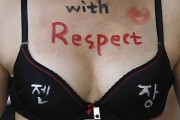Kim Eri has written another controversial article as a follow up to her editorial about discrimination against women first reported on koreaBANG here. Ms. Kim sought to counter the new movement among Korean men to oppose “reverse discrimination” by over-empowered women. The article uses comments from koreaBANG readers as evidence that Korean men are ignorant of the problems women face at home and in the workplace.
Online reaction to the follow-up article was dominated by sharp attacks about the author’s “lack of logic” and misunderstanding of gender relations. Netizens drew distinctions between gender inequality in Korea and gender inequality in the rest of the world.
Throughout Ms. Kim’s comprehensive analysis of modern discrimination against Korean women, she also points out certain problems that are distinctly Korean and which carry their own unique challenges. In particular, the author warns about the legacy of sex-selective abortion, which is predicted to lead to an imbalance of 128.3 Korean men for 100 women by the year 2031. She also addresses military conscription for young women, often suggested as a way to break down inequality.
From NEWSis:
Kim Eri’s ‘Pop Culture’ – ‘Boseulachi,’ and now Gender Equality of the Developing World
On the 16th of this month, my column ‘What Boseulachi, You Pitiable Men’ started a controversy. It was not only introduced by koreaBANG, a website which reports hot issues in Korea and translates them for a foreign audience, but also received much attention from foreigners who live in Korea. They, as outside observers, seem to rebut the arguments made by Korean men, accusing them of discriminating against women.
Foreigners criticize Korean men, saying “women take responsibility for making a living as well as raising children. Korea treats its women as cows to be milked. It is the most anti-woman country I have ever lived in…It’s clear that [male critics] have never been outside of this country.” In regards to the argument about the low life expectancy of Korean men compared to Korean women, a foreign man said that their life expectancy will rise if they spend less time drinking after work and abstain from spending as many hours smoking during the workday as they do behind their desks.

Newly created www.boslachi.com, the website slogan: “For the Sake of Gender Equality, We Dream of a Restoration of Men’s Rights!”
Another foreigner talked about his experience in a Korean work environment, saying that women run errands, have to make coffee, and get scolded by their boss. The man further said that men receive 50% more salary than women in similar positions. Women are also required to participate in drinking after work, where they are plied with alcohol and treated like trash.
I have received so many email replies regarding my last article that my inbox ran out of space. There were many readers, who seemed to be men, who just threw insulting words at me. I was shocked. My expectations about events like the forced entry of the Jecheon Women’s Library by the Man of Korea coalition, that it would be regarded as a bad joke by people desperate for attention, were completely off the mark.
People always seem happy to talk about older women who never had the chance to go to school making donations to education, but when it came to the Jecheon Library, all people could do was criticize. In her will, Mrs. Kim Hak-im left her life savings to make a place where women could nurse infants and study. (I had the chance to see reports from 1970-2005 that listed all of those people who had given their life savings to schools. Of the 94 such donors, 87 were women. A number of Comfort Women were among those who gave the money they had struggled to save as a way to get over their frustration of being excluded from education. The devotion of such women reminded me of the line from the end of Goethe’s Faust, “I have been saved by the fact that I will forever be a woman.”
On the other hand, there were also many readers who sent in their support, women who took strength from sharing their difficult experiences via email. After reading such response, it is clear that woman who enter the workforce all face a similar situation. “Every time there is an office party, they always make sure to bring along all of the female employees and sit them next to the boss. The people who harass us, either verbally or physically, are the ones who control the event and the person who points out the offending behavior or protests is called a stick in the mud, a prude, and a whiner. The more such behavior comes to light, the more it is clear that the losers are always women.” Another wrote, “when I say that I lack the confidence to return to the workforce after marriage, they tell me: ‘then you’re just going to drop out and not make any money?’ I take care of the house and the children, then I have to go to work and suffer there as well because I am a woman. They ignore those problems and tell me to be a ‘Super Mom’.
Why is it that a certain group of Korean men persist in calling these situations “reverse discrimination”? One can find the answer in a number of recent reports. Among the 34 member countries of the OECD, South Korea has the highest rate of suicide and the lowest birth rate. Presidential Candidate Ahn Cheol-soo has stated that “a majority of our citizens are extremely unhappy about the future and unsure of where we are going.” As can be seen from the creation of the word “Boseulachi” (made up of the derogatory word for vagina, “boji”, and the the Chosun period term for state official, the combination of which implies a sense of entitlement for having a vagina), men are looking for a scapegoat for the numerous societal issues and have decided to blame women, weak as they already are. Professor Chin Jung-kwon of Dongyang University recently published an incisive analysis of the situation on Twitter: “during an economic recession, men in difficult straits are lowered to the level typically occupied by female workers. Such men begin to feel that they are no better than so-called “gold misses”. Those who are economically successful remain superior to women, while poor men come to believe that gender equality is already a reality. As women gain more power, the foundation of male superiority begins to crumble. Fearing a loss of their own power, men turn to disparaging women.”
An even more disturbing aspect of the current situation is that many young men are also expressing sympathy for the “boseulachi” term. If you consider it carefully, they are the real victims of the preference for boys that emerged in the era of male superiority. Such young men grew up in a time when abortion of female babies was so common that doctors were forbidden from telling couples the gender of a foetus According to predictions from the National Statistical Office, as of 2015 there will be 110.8 men of marriageable age for every 100 women. By 2031, that disparity will increase to 128.3 men. The result will be extreme difficulty for men born in a society dominated by male favoritism. In the end, frustrated by an inability to marry women their own age due to a severe population imbalance, such men will vent their feelings against the opposite sex.
Despite reports about an increase in international marriages and wives brought over from Southeast Asia, the regressive values held by Korean men do not change. So long as discriminatory attitudes against women remain, there will be no resolution of the marriage crisis. I have seen comments sympathizing with foreign wives who cannot stand their marriage to a Korean man and who flee their new homes, saying “I wonder why all of these twenty-year-old women who leave their impoverished homelands to get married in another country become gold diggers as soon as they get involved with a Korean man.” Of course, there will be some women who have malicious intentions from the very beginning. But it is also impossible to deny that there are many cases where foreign wives suffer from abuse, marital rape, and the assumption that they are merely a product that has been purchased. Such women have lost their hopes of a “Korean Dream”.
This imbalance and strife between the genders will not end with a marriage crisis, it will go on to create many different problems that affect the whole society. The Wall Street Journal quoted Unnatural Selection, a book by Mara Hvistendahl, when it reported that a preference for male children has resulted in the abortion of 1.63 million girls in China, India, and South Korea since the end of the 1970s. The newspaper warned of future disasters related to the gender imbalance. “Historically, men have had a more violent and destabilizing effect on society than women.” Rising rates of unmarried men will lead to increasing crime rates. In modern India, the factor most closely correlated with violence and crime rates is not income but gender imbalance.
Rising rates of sexual assault by men against women also offer evidence for the theory that gender imbalance is leading to societal problems. There are many men who express their tendency to violence by resorting to physical attacks against the weaker sex. It is still true that the majority of violent offenders are men and the victims are women. Violence against women has become so institutionalized that it rarely even makes the news anymore. A few weeks ago, the news reported a story about a civil servant who intervened to help a young woman being beaten by an older man. The assailant ended up turning his rage on the civil servant, beating him so badly that his eye was crushed into his skull. Were it not for such gory details, the story would have been ignored. Such a reality makes it difficult for parents of women to ever feel at ease.
Sweden is part of the group of northern European countries known to have the highest measures of equality between the sexes. It was the arrest of Julian Assange, creator of the investigatory website WikiLeaks, that brought Swedish laws on sexual crime to our attention. During one of Assange’s intimate encounters, his female partner told him that she would only consent if he used a condom. After finding a torn condom in the morning, the woman reported the encounter as sexual assault in order to compel Assange to take an STD test. It is part of Swedish culture to take incidents of sexual harassment both minor and those that are disruptive to the social atmosphere to the police. Such a significant trend of strict punishment of sexual crime is possible because of their popular culture. While relations between the sexes may be liberal, there is also a strong belief in keeping one’s body safe. Because of the different criteria for sexual crimes in Sweden it is difficult to compare its statistics with those of another country. In cases where perceptions are slow to change, it is necessary for laws to take the lead. In the case of Sweden, such legal protections are support by a culture accepting of unisex bathrooms, showers, and sleeping arrangements.
Finally, on the 23rd of October (Swiss time), gender inequality made it to the main stage of the World Economic Forum. Out of the 135 countries in attendance, South Korea placed 108th on measures of equality between the sexes, dropping one position from last year. Looking at the individual measures of equality, Korean women place 116th in terms of economic participation and opportunities for participation. They are 99th in terms of education, 78th in health and safety, and 86th in political power, all low scores. According to the report’s findings, gender equality is not just related to human rights and general equality, it is also directly connected to economic effectiveness, “As an example of how gender equality contributes to economic growth and stability, during the past 10 years, the growth in the European economies was due to the shrinking gap between hiring of men and women.” Such a statement should be looked at closely in our society. It is not a coincidence that countless specialists have all said that use of female workers, particularly highly educated women, is a way forward for the Korean economy.
The negative conditions that I have described so far in addition to pay disparity and the glass ceiling all handicap women’s performance in the economy. The coalitions of men that now target women point at the low economic performance and call it another inequality that adds to their burden in providing for the family. In this way, discrimination leads only to more inequality. Women’s need for self-realization and empowerment in their life are being pushed aside by their professional obligations. Our nation’s political and economic situation is struggling, but our government ministries devote only minimal resources to combating discrimination against women. To make matters worse, current politics shies away from the topic of gender inequality, preferring to look at the “family”. The Ministry of Gender Equality and Family is losing its original mission to reduce discrimination, all the while facing strong criticism for its policies. Less than 1% of employers offer menstruation vacation, while they all argue about veteran’s preference, (the overwhelmingly majority of veterans are men), a policy of questionable effectiveness.
Of course, this is not to say that I am unable to sympathize with young men who spend two years of their young lives in difficult military surroundings and who often feel that such a sacrifice is not recognized by society. While there are vague calls for women to be drafted alongside men, it is obvious that such a burden would only increase the cost of a woman’s menstruation and maternity obligations and aggravate the problem of a low domestic birth rate. Since it is still unclear how the current dominance of sexual violence and harassment develops under our strictly hierarchical military culture, instituting conscription for women would be a rash and difficult step. (There is the relevant case of the winner of the Audience Award at the Sundance Film Festival this year: “The Invisible War”, a documentary about the fact that in the American military, more female soldiers are raped than die due to enemy fire).
It is critical that we point out and overcome the immaturity that points the finger at Korean women and accuses them of being the cancerous factor within our society that blocks progress. This juvenile attitude ignores the real need for reforms of government policy and political participation. So long as there is an absence of revolutionary changes in perception, it seems unlikely that our measures of gender equality, so long lagging behind international standards, will ever rise.
Despite the need for new laws to support the fundamental rights and interests of women, such decisive changes will remain impossible so long as conservative men’s groups are unwilling to come to any kind of an agreement. One way to possibly reach solutions in the long run is through education. Cultivating new values of gender equality must begin in schools and in homes. This would be fundamental instruction about human rights that teaches people to regard one another not as men or women, but as human beings. Sex education is also important. We must remove the theme within sex education that describes women as sexual objects.
As feminists have argued, it is also necessary to include the history of women into school curricula. Due to the trend of favoring men within historical documents and textbooks, it is hard to find any of the values created by women amidst the litany of male values. Such continuing education programs as couples’ counseling and Father School are also ways to realize the goal of teaching gender equality.
This discussion brings to mind a conversation I once had with an elderly man. After he had listed reasons why men are superior, I answered him, “do you think it would have been possible for you to get to this point in your life without the help and sacrifice of your mother and older sisters?” It was only then that he seemed to abandon his argument. For lack of any opportunity to reflect on the values of women, he had automatically formed the belief that men were the superior gender. It was at that moment that I saw hope.
Comments from Naver:
hoza****:
She’s such an extreme dogmatist, believing blindly that she’s right. Such extremists are prone to bossing around without courtesy.
sinn****:
Have you read those emails from guys thoroughly? She seems impossible, dismissing whatever guys criticise about her opinion.
hoza****:
She’s got big ego, thinking that she’s freaking enlightened. However rational what we say here doesn’t matter. She’ll just shrug it off. She’s rational on the outside, and completely emotion on the inside: so typical Aristotle type of woman. We can’t keep the conversation sensible with her.
21cp****:
This chick is ridiculous. I sent her an email opposing her article nice and logical. I wonder if she read those emails she got. She’s simply tarring all of them with the same brush. I bet she didn’t even read any of them. We have to take action: do not let her get away with this. Let’s send emails and make phone calls. NEWSis phone number: 02- 721- 7400 It’s okay to call the newspaper, as long as you keep conversation civil. It is us readers’ right to complain about such an absurd article.
hoza****:
Is Naver News her domain? Her article keeps coming up on it.
mkjillkjkj:
How could this rubbish article written by a psychotic lady end up popping up as a main article of Naver? Isn’t Naver supposed to have someone to correct this situation? And how could she claim herself as a ‘critic’? Critic my ass! Her articles seem full of same old absurdity that only supported by crazy femi-nazis. I think they equally qualify as a critic.
wina****:
Unbelievable. How come such a man-hating article written by a female-dominance supporter end up in a newspaper? She’s facing a lot of friction due to her faking being rational, even though her articles are obviously biased. She’s not doing a job as a critic, but showing her prejudice.
imcm****:
Huh huh This crazy bitch is writing a freaking novel. I knew you’d bring up that inequality index. You could’ve easily found articles that explains why it’s an absurd, biased figure. And this bitch doesn’t say a word about what females do wrong. Slimy boseul bitch!
ank2****:
Although the word boseulachi refers to beanpaste girls, it looks ugly when guys use the word for any unlikable females. But Kim Eri, you went too far! Your writing seems provocative and ego-centric. I couldn’t keep reading it after one or two paragraphs.
rbgu****:
Korean guys are not the ones who make comfort women grandmas shameful, but some Korean women who sell their bodies abroad are. What is she talking about?
east****:
Reading this article thoroughly, the point she is making is not clear. She may be content with her work, yet all I can see is her victim mentality. Her value system seems pathetic.
muhw****:
This article is solely written on females’ point of view. It’s not objective enough. Those referred internet comments only serve her point, scrap here and there as she pleases. So your article should go straight to a rubbish bin!! For the record, foreign females usually stand up for gender equality, whether that advantages them or not. On the other hand, Korean females raise gender card only when they manipulate the situation for selfish reasons. Otherwise they would say ‘men and women are different’!! Korean females and foreign females have completely different notion of gender equality.
miso****:
Oh boy.. She’s a so called critic..;; People like her remind me of extreme right wingers in Japan.
file****:
Isn’t she a secret agent from the Ministry of Gender Equality and Family? ke ke They’ve got to scout her ASAP. She’s such a talent ke ke
gree****:
The summary of her last article: boseulachis have wisely adapted to the environment, foreign males don’t get whiny about conscription system, stop acting petty, and foreigners called Korean guys assholes. Her articles are preposterous! You generalise as much as you want and call it ‘logical.’
seaf****:
She’s fraught with inferiority complex. Her mother probably liked her brother more than her, leaving her felt mistreated. Or, she probably just hasn’t overcome the phallic phase.
ttl0****:
Even countries like the U.S. has less than 20 percent of female executives. Those executives earned their job because they work hard and socially adept. Read Carly Fiorina’s biography. Being American doesn’t guarantee such an important position for any women. Companies sometimes prefer foreigners over Koreans to maximise the profit these days; they don’t intentionally marginalise women for no good reason. Competent women don’t complain like this critic.
mua2****:
In short, women have been the underdog, and now it’s the time for guys to get fucked up.
heey****:
ke ke Do we need to talk about this article anymore? Whatever we say here will go in one ear and out of the other: her mind is unchangeable. Arrrrgh! ke ke
spc7****:
She doesn’t seem to get a full grip on the meaning and origins of boseulachi. Do men use the word for any random females?










